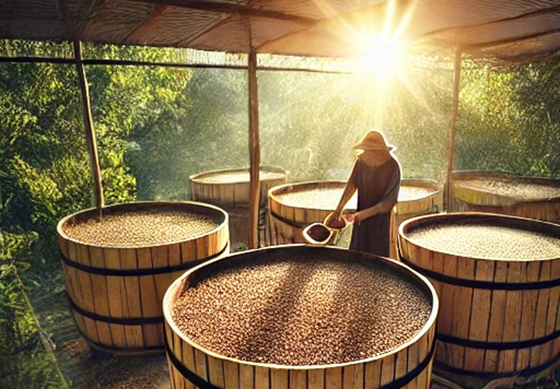Initially, the goal of fermentation was simply to quickly remove the pulp from the beans. However, producers soon discovered the link between fermentation and the coffee's flavor. Through fermentation, natural coffee develops a unique taste profile influenced by the processing methods, environment, and fermentation conditions.
Fermentation is a crucial stage in the full cycle of coffee production, which includes the following steps:
- Harvesting the Cherries
Coffee cherries are harvested manually or mechanically. Only ripe fruits are used, as their quality directly affects the final product. - Cherry Processing
After harvesting, cherries undergo processing, which can be natural, washed, or honey-processed. Fermentation begins during this stage. - Fermentation
Microorganisms transform natural compounds in the cherries, breaking down the pulp and altering the beans' flavor profile. This process can last anywhere from a few hours to several days, depending on the chosen method. - Drying
After fermentation, the beans are dried to reach the optimal moisture level.
The Functions of Fermentation:
- Bean Cleaning
Microorganisms break down the cherry pulp, simplifying subsequent cleaning processes. - Flavor Formation
The intensity and duration of fermentation determine which flavor notes will dominate—whether fruity, chocolaty, floral, or spicy. - Quality Enhancement
Properly conducted fermentation results in balanced coffee beans with a distinct flavor profile.
Types of Coffee Fermentation:
- Aerobic Fermentation
Beans remain in contact with oxygen, typically in open tanks or bags. This type of fermentation is influenced by environmental factors like temperature and humidity, making it more complex and less predictable. - Anaerobic Fermentation (Oxygen-Free)
Beans are placed in airtight containers with low oxygen levels. Compared to aerobic fermentation, this method allows for greater control over factors such as temperature, pH balance, sugar content, and duration. - Lactic Acid Fermentation
Producers add lactobacillus cultures, which develop lactic acid, imparting smooth and creamy flavor notes. - Experimental Methods
Producers experiment with new approaches, such as adding fruits or spices during fermentation, resulting in even more unique coffee flavors.
Why Fermentation Matters:
Fermentation is a critical stage in coffee production that significantly impacts the bean’s quality, aroma, and taste. When choosing coffee for an espresso machine or alternative brewing methods, consider its processing method. Fermentation, while invisible, is an essential step that brings out new flavors and aromas in coffee beans.


